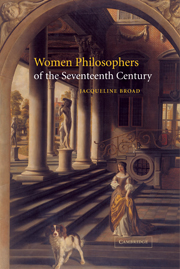Introduction
Published online by Cambridge University Press: 22 September 2009
Summary
There are few scholars outside of the history of philosophy who have heard of Elisabeth of Bohemia (1618–80), Margaret Cavendish (1623–73), Anne Conway (1631–79), Mary Astell (1666–1731), Damaris Masham (1659–1708), and Catharine Trotter Cockburn (1679–1749). These women philosophers are now mere footnotes to the standard historical–intellectual accounts of the early modern period. There is no history of scholarship on their works, and there are no long-standing disagreements or controversies about interpretations of their views. Although a number of their works have been reprinted, the bulk of their writings can be found only in rare-book rooms, and a few of their manuscripts still remain unpublished. Yet in the seventeenth century, these women were the friends and correspondents of famous philosophers of their time, such as René Descartes (1596–1650), Thomas Hobbes (1588–1679), John Locke (1632–1704), and Gottfried Wilhelm Leibniz (1646–1716). Some women discussed philosophy with these men, they raised philosophical questions in letters, and they wrote and published their own thoughts on metaphysics. Male colleagues dedicated books to them, and many of their contemporaries acknowledged their influence or praised their understanding.
Feminist philosopher Mary Astell is a notable case in point. In 1693, Astell took the bold step of writing to the English philosopher-divine, John Norris (1657–1711), to present her criticisms of his views. ‘Sir’, she writes,
Though some morose Gentlemen wou'd perhaps remit me to the Distaff or the Kitchin, or at least to the Glass and the Needle, the proper Employments as they fancy of a Womans Life; yet expecting better things from the more Equitable and ingenious Mr. Norris, who is not so narrow-Soul'd as to confine Learning to his own Sex, or to envy it in ours, I presume to beg his Attention a little to the Impertinencies of a Womans Pen.
- Type
- Chapter
- Information
- Women Philosophers of the Seventeenth Century , pp. 1 - 12Publisher: Cambridge University PressPrint publication year: 2003



